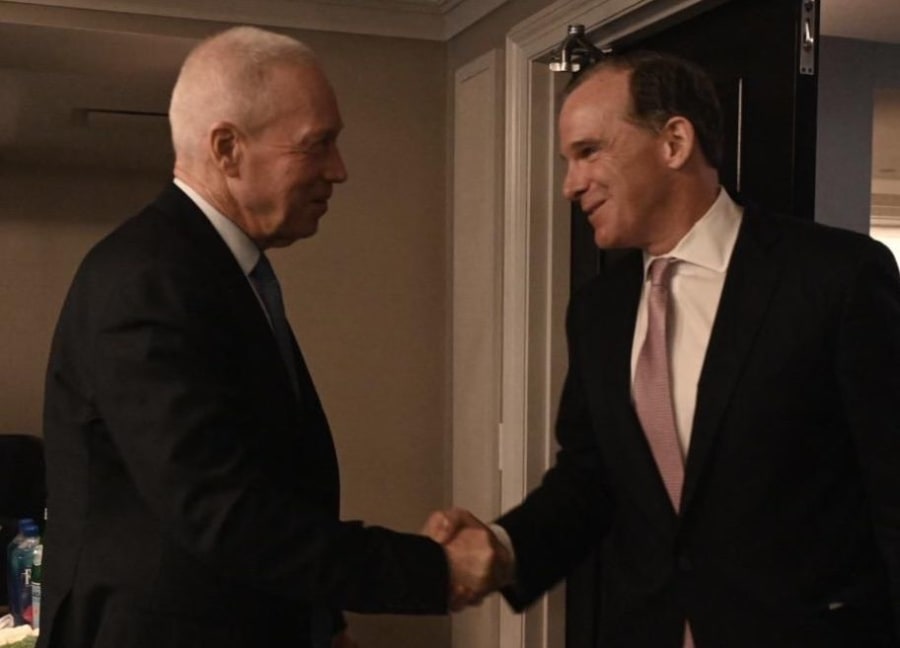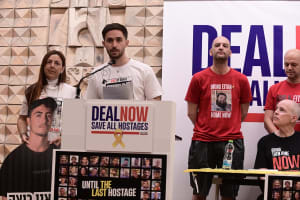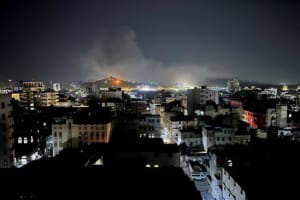Israeli defense minister raises concerns to US officials about Saudi civilian nuclear power
Saudi leaders are reportedly demanding US assistance to develop a nuclear program in exchange for peace with the Jewish state

Israeli Defense Minister Yoav Gallant, who is visiting the United States, has inquired with Biden administration officials about the details of a potential Saudi nuclear program within the context of a possible peace deal with Israel.
Saudi leaders have reportedly demanded that the U.S. assist them in developing a nuclear program for civilian purposes, as well as offer “security guarantees” in exchange for normalization of ties with the Jewish state.
Gallant met with White House and U.S. State Department officials on Wednesday in New York.
The defense minister presented Israel’s concerns over Saudi nuclear capabilities and sales of advanced weaponry, based on assessments from the country’s security establishment, according to Israeli media outlets reports.
“During his meeting with White House Coordinator Brett McGurk, Minister Gallant raised the importance of expanding the Abraham Accords to include additional partners in the region. He also emphasized the importance of security arrangements for this purpose,” Gallant’s office said in a statement.
“Minister Gallant expressed his appreciation to the Coordinator for his ongoing investment in normalization efforts between Israel and countries in the region. He also raised the importance of preserving Israel’s qualitative military edge,” it added.
The defense minister briefed U.S. officials about Iran’s actions that are undermining stability in the Middle East, emphasizing that “Israel will know how to defend itself against any threat or attempt to harm its civilians.”
Gallant also met with Assistant Secretary of State for Near Eastern Affairs Barbara Leaf and U.S. Ambassador to the United Nations Linda Thomas-Greenfield.
He reviewed the Israel Defense Forces’ latest counter-terrorism operations in Judea and Samaria, also known as the West Bank, and noted that Iran has been concentrating its efforts on that front by smuggling weapons and transferring funds to terrorist elements.
In contrast, Saudi Arabia is reportedly pressing Palestinian Authority (PA) President Mahmoud Abbas to crack down on militant groups in the area, urging him to bring the security situation under control.
The Wall Street Journal reported on Tuesday that Saudi leaders pledged to renew the kingdom’s financial assistance to the PA. The move is widely viewed as an attempt to garner Palestinian backing for the Saudi outreach to Israel.
In an interview with PBS earlier this month, Israel’s Strategic Affairs Minister Ron Dermer implied that Israel will not necessarily outright object to a Saudi civilian nuclear program,
“Like so many things, the devil is in the details, and we’re going to have to look at what ultimately is agreed upon,” Dermer said.
“The Saudis could go to China or they can go to France tomorrow, and they could set up — ask them to set up a civil nuclear program and to allow for domestic enrichment. They could do that tomorrow if they wanted to,” he continued.
“So the question that I asked myself is, if the U.S. is involved in this, what will that mean 10 years down the road, 20 years down the road, 30 years down the road, and what’s the alternative? There are other issues the Saudis have put forward.”
Israeli opposition leader Yair Lapid suggested that rhetoric of this kind and Saudi nuclear power could put Israel’s security at risk. Yet Lapid, unlike Dermer or Netanyahu, supported the original nuclear deal with Iran.
He is expected to meet with Biden administration officials in Washington next week to raise his concerns.
An unnamed Israeli government official told Ynet news that Israel has not given its green light to a Saudi nuclear program.

Tal Heinrich is a senior correspondent for both ALL ISRAEL NEWS and ALL ARAB NEWS. She is currently based in New York City. Tal also provides reports and analysis for Israeli Hebrew media Channel 14 News.














